- Home
- Patricia Highsmith
A Dog's Ransom Page 27
A Dog's Ransom Read online
Page 27
Morrissey arrived, looking fresh, and gave Clarence a preoccupied glance as he strode past and went to the same room (Clarence thought) as the one he had been in yesterday. Another twenty minutes passed, and Clarence put his head against the wall and fell asleep. It seemed a better sleep than he had had all the preceding night, but when a middle-aged cop shook him awake, Clarence saw that only ten minutes had passed. Clarence was ushered to a room, the same room as yesterday, where Morrissey awaited him behind the desk.
“So Dummell—it’s only a matter of time now. Isn’t it? Minutes, maybe. Sit down.” Morrissey was seated. “We’ve spoken with Edward Reynolds. He sounds no longer so ready to defend you—protect you.” Morrissey smiled. “You have nothing to say to that?”
“No.”
“And Miss Coomes—she won’t be turning up either. You’re all alone today. No chums. Let’s go to another room for a change.”
Morrissey led the way, leftward in the hall to another door. It seemed to Clarence that a couple of cops in the hall looked at him with a strange amusement, but he might have been mistaken. They went down some stairs, then into a larger square room with a desk in its center. There were no windows in the room, and there was a whirr of an electric ventilating machine, or maybe the heating system, which evidently operated by means of the grilled vents near the ceiling. There were two straight chairs, and Morrissey took one, but he said to Clarence:
“Walk around a little. You look sleepy.”
Clarence did not feel sleepy. He laid his coat on the other chair and walked around, slowly. He was still walking an hour later, circling the desk widely, reversing when he wished. This was what he had expected. This could go on until he dropped. Clarence did his best not to listen. He thought this a good precaution against becoming angry.
It was, of course, true that the Reynoldses would not stand by him. Wasn’t it true? Ed had declined to see him today, not refused exactly, but said it wasn’t a good idea. Marylyn was—in a way unreachable. Clarence’s right leg had begun to hurt. It was the leg in which he had had the bullet wound. He took a breath and glanced at the pale gray walls as he made a turn.
“. . . in the face of the clearest evidence I’ve ever seen . . . wasting people’s time . . . Admit it, Dummell! What’s all this jazz? You’re trying to be a hero? The very . . .”
Morrissey’s voice shut off again as if by magic. Clarence looked at the gray walls which blended to near charcoal in the upper corners. He held his head higher. Morrissey was calling him a lying piece of shit. Worse. In a curious way that seemed comical now to Clarence, he was censoring Morrissey’s unending speech. Clarence felt separate from it, untouchable. That was the word (Morrissey had used it) untouchable, and so what the hell? He was different, fine. But did Morrissey expect him to cringe? Morrissey could think again!
Morrissey sat drinking from a paper cup of coffee. Clarence had not been offered any coffee. (The coffee was muck anyway.) The coffee had arrived via a uniformed lackey some minutes ago, along with a piece of pie. It was 5:37.
Clarence stopped and faced Morrissey with a slight smile.
“. . . not the guts to—” Morrissey’s voice ground to a halt like an old phonograph record.
Not the guts to what? Clarence felt that he could face anything. They could pull his fingernails out tonight, his teeth—which he was now clenching. Morrissey was awaiting a word from him. Clarence wasn’t going to give it. He stared at Morrissey, who was becoming angrier.
“So?” said Morrissey finally.
Clarence was silent. He stared at Morrissey until Morrissey’s eyes flickered and looked down at the papers before him. Morrissey looked even a trifle frightened, Clarence noticed, though there was a telephone and the usual box of buttons on the desk so Morrissey could summon a couple of strong men in a trice if he wished. There was probably a gun somewhere, too, maybe in a drawer.
“So? Can we have it now, Clarence? Just a simple statement, ‘I clobbered the guy on Barrow Street.’—Let’s have it.”
Clarence almost closed his eyes, but otherwise he did not move.
“Walk,” said Morrissey.
Clarence didn’t walk, and Morrissey got up and hit him in the jaw. It was quick, more with closed fingers than a fist, but Clarence felt Morrissey’s anger in its sting. Slowly Clarence walked, just as before. He wasn’t angry. He felt in fact marvelous, and stood taller.
Morrissey was on the phone now. The telephone on his desk had buzzed. Clarence was not curious, but he listened just to have a change.
“No, not yet,” said Morrissey. “No, I’m fine . . . You can tell him he’s here, sure . . . Okay . . . Okay.” He hung up. “Your precinct. Want to know if you’re here. If you’ve talked yet.” He gave a short laugh and lit a cigarette. “You probably thought it was Mr. Reynolds wondering about your health.”
Clarence tried to turn Morrissey’s voice off again. Maybe it had been Ed. Morrissey had spoken with a cop, not the person who had telephoned. But probably it hadn’t been Ed. Very probably not. Clarence reminded himself of his newfound strength: he didn’t need Ed any more. Not that he didn’t like Ed. That wasn’t the point, but he didn’t need him, or Marylyn. And the night was young.
“Like a sandwich?”
This question from Morrissey came many minutes later. Clarence was deliberately not looking at his watch any longer. But Morrissey said:
“It’s nearly nine o’clock.”
Clarence was still in a mood not to say anything, so he didn’t.
Morrissey got up and was about to swat him again, so Clarence said:
“A sandwich and milk.”
“Milk? No coffee?”
The coffee, like Morrissey, like everything, was so disgusting, why say so?
Clarence was allowed to sit down while he ate most of a liver-wurst sandwich and drank milk through a straw. Then he was told to walk again.
Morrissey was more tense. He wanted to wind things up tonight. Clarence felt ready to take on Morrissey’s replacement, to walk on and on until he dropped, and even if he dropped, they wouldn’t get anything out of him. How could they get anything out of him, if he didn’t choose to say anything? Now was the time for a lie-detector test, Clarence thought with sudden joy: he felt he wouldn’t have the least reaction. For hours now, Morrissey’s monologue had been rolling off him like—like—
The telephone rang, or something buzzed, and Clarence tripped and had to catch himself. He was a bit tired, he had to admit. Morrissey was talking, laughing. What time was it? Clarence did not look at his watch. It didn’t matter.
“Yeah, you have got a nerve,” Morrissey was saying. “Well, all right, all right, you’re excused.” Morrissey looked at Clarence. “Your other chum, Manzoni.”
Clarence faced Morrissey, who was not looking at him now, but talking into the telephone again, joshing with Manzoni, I’ll talk with the bastard. Clarence wanted to say, suddenly angry as if Manzoni had intruded on what had been a pleasant atmosphere.
“Okay. Do you want to talk to him?” Morrissey said, extending the telephone towards Clarence.
Had he spoken out loud? Clarence didn’t know, but he took the telephone. “Manzoni!” Clarence said, a little gaily.
“Dummell. Clarence. I hear you’re getting the treatment! Cracking up, hey Clarence? So they tell me.”
Manzoni’s ugly voice was suddenly a focal point for Clarence. Clarence cursed him. Clarence was fluent.
Morrissey’s laughter made Clarence stop.
“. . . cracking up!” Manzoni was laughing too.
Clarence put the telephone down.
“Why’d you put the phone down?” asked Morrissey, grinning. “I didn’t tell you to put the phone down.” Morrissey swung at Clarence, not meaning to hit him, and his hand was inches short.
Clarence resumed his slow walk
ing about the room. Yes, he’d made a mistake losing his temper like that with Manzoni. Still, not a serious mistake. It could be overcome.
“You don’t like the police, do you, Dummell? You’re an outsider.”
“How do you mean that? I wouldn’t have—”
“You’re not one of us, so I’m told. You look down on the police force.”
It was too complicated to explain. Also Morrissey didn’t want clarification from him. Things would’ve gone better for him, Clarence supposed, if he’d been “one of them,” one of the kickback-takers, one of the boys. Was that what Morrissey meant? Even though Morrissey had the rank of detective and wore plainclothes, he was one of the boys, Clarence supposed.
“I didn’t—” Clarence stopped, too exhausted to begin.
“What?”
“I didn’t join the force to be a spy, to look—”
“Who said anything about being a spy?” Morrissey laughed.
“I thought a great deal of the police force. That’s why I joined up.” To be of some service, Clarence thought, but he didn’t want to be met with more laughter.
Morrissey nodded with an attitude of contempt.
Cops had protected cops in his situation, Clarence was thinking. He’d heard of it. It was common knowledge. But they weren’t protecting him. Clarence felt anger and self-pity rise in him. He tried to fight it down. This was what Morrissey wanted him to feel.
Morrissey was saying something else.
Clarence put his hands over his face. He was tired, angry, frustrated. He heard Morrissey cursing to himself.
Morrissey left the room, impatient because his replacement had not turned up. Morrissey had been yelling into the telephone about it. Clarence flung himself into the straight chair, on top of his coat, put his head back and stretched his legs out, like a boxer resting between rounds. Clarence fell asleep as if being sucked down a black, spiraling hole. Then a hand shook him vigorously on the shoulder, and he looked up into a dark, smiling face. A rugged Italian type of face, a strange face.
“Get up, mac,” the man said in a deep voice, and walked towards the desk.
Clarence got up.
The two men looked at each other. It was plain to Clarence that the man was assessing him: how tired was he, how hostile? Clarence was so tired as to feel mushy; at that moment, no doubt his face looked mushy too, but he wasn’t weaving on his feet.
“Well, it seems—Yeah. Hm-m,” said the dark man, looking at his notes.
In the next minutes, it was the same rehash of the Rowajinski story. The man was limbering up. It had a faintly soporific effect on Clarence. Clarence sat down. He remained seated four or five minutes until the man told him to get up again.
“Keep walking,” he said. “You said in one place here your girlfriend Marylyn is a sound sleeper, she didn’t hear you leave in the morning. Maybe she didn’t hear you that night when you left her apartment and came back. When you went out and found Rowajinski . . . Isn’t that possible? What’ve you got to say?”
“I didn’t go out—that night.”
The man continued. Dates. The visit to Bellevue. His effort to start a friendship with the Reynoldses. His attempt at friendship. “. . . nothing to say?”
“No, sir.” Clarence was walking about, circling slowly. A while ago he had wanted to pee, and now he didn’t. Strange. The toilet was down the hall to the right.
“. . . and now your friends have walked out on you . . . Would you stand up straighter? You can make things a lot easier for yourself if you admit these facts which I’ve got right in front of my eyes! If you admit that—that you left your girlfriend maybe around eleven or twelve that night, went straight to Rowajinski’s neighborhood and found him and beat him up! Admit it!”
“I did not!”
“You’re going on trial, you know, and if you plead not guilty, they’re going to slam you!”
“That’s too bad!”
It went on.
“. . . mustn’t think your girlfriend’s going to keep on protecting you. She’ll have a limit just like you, just like everybody . . . our guys aren’t finished with her either . . .”
Clarence dropped to the floor. The dark-green cement seemed to come up and hit him like a punch in the cheek, and he was instantly alert, pushed himself up and stood up, facing the desk over which there was a light. There was a buzzing which seemed to be in the very crown of his head. Or was it the telephone? No. The dark-haired man was half twisted round in his chair, yelling something at him.
“. . . going! Keep going! Are you going to talk for me?”
Now a punch in the stomach. The man was suddenly right in front of him. Clarence blinked, hurting.
“The time-wasting! For Christ’s sake, give it! . . . Save yourself . . .”
Clarence asked to go to the toilet. He realized he was mumbling. Exasperated, the man accompanied him, asking him to leave the door open so he could see him, just as Morrissey had done. There was a basin. Clarence wet his head, drank out of his hands water that tasted of the liquid soap he had washed with. When they came back into the room, Clarence went to the chair and sat down on his coat.
“Get up!”
Clarence got up. “I am not saying anything else tonight, not to you or anyone.” Now he was weaving a little, and his feet felt damp with sweat. But he was chilly now, not warm.
The dark man, angry, started to say something and didn’t. His lips had started to form words. Then he went to the telephone. Clarence didn’t bother listening. The conversation seemed to go on for five minutes or more. Clarence looked at his watch, with difficulty focused his eyes, and saw that the watch said 3:22. He felt the knob of the watch to see if it had pulled out and caused the time to be wrong, but it hadn’t. It was 3:22 a.m. Monday.
“Do you want this to go on and on?” asked the dark man who had hung up. “Tomorrow and the next day? Let’s have it now! . . . We can give you a shot . . .”
A shot to keep him awake or to make him talk? Clarence was wilting again. His eyes stung.
The man went again to the telephone and yanked it up, pressed a button. He had loosened his collar and tie, and looked quite a different person from the one who had arrived several hours ago.
“I dunno if I need any help here or not . . . No, no, not that.” He was muttering, sullenly.
Clarence turned off his voice as if it were a language he couldn’t understand. Let them bring up reinforcements, fine! Let them give him shots to pick him up, bennies so he couldn’t sleep for days! He wasn’t going to talk for them. They could kill him, and he still wouldn’t talk. As torture went, what he was going through now was nothing, and Clarence didn’t feel sorry for himself. He felt brave. It was exhilarating.
“Let’s go, I said!” yelled the dark man.
Clarence turned around.
The man was walking towards the door, jerking his thumb. “Get your coat.”
Clarence supposed that they were going to another room. They climbed the stairs, walked down the hall towards the front door. Out into the cool air. There was a taxi, evidently summoned by the patrolman on the pavement.
The dark-haired man opened the door and said, “You’re going home. Nineteenth, isn’t it? . . . Don’t try to go anywhere else. We can always find you.”
The taxi door slammed. The driver had the address.
Clarence got up his stairs. He took off his tennis shoes and his trousers, washed his hands and face perfunctorily, and fell into bed. It was very dark. His ears rang in a pulsing way. Minutes later, he woke up with a terrible sense of falling, and sat up in bed. He fell back on the pillow again, tense, and not at all sleepy now. His brain was spinning. Morrissey, Marylyn, Ed Reynolds, Greta. They were not doing or saying anything, only whizzing . . . And there was a ringing.
The ringing was real.
Clarence groped for his telephone, then realized it was his doorbell. Who was it? Marylyn maybe? No, the cops, certainly, making sure he was home. Clarence didn’t want to let them in, but they’d break in if he didn’t, he supposed. He found a light, and pushed the release button. Then he opened his door a little. He heard a single pair of feet on the stairs, not climbing fast, a man’s tread.
There was a dim light in the stairwell, and Manzoni’s figure came into view. Clarence started to shut the door, then hesitated. Manzoni smiled a little, seeing Clarence.
“Hyah,” Manzoni said. “Just checking. Can I come in?”
“No. Checking on what?”
Manzoni, stocky and determined, smilingly pushed the door wider and came in. “That you’re here. I heard you’re very tired but you didn’t talk yet.”
“Piss off, Pete.” Clarence picked up his trousers from a chair and put them on, keeping an eye on Manzoni.
Manzoni had lit a cigarette. He was hatless, his coat unbuttoned now. Clarence thought he might have his gun with him. Clarence looked at his watch. It was twelve minutes to six.
“Y’know, Clarence, I talked with your two chums today, Marylyn and Reynolds. It’s only a matter of time till Marylyn’s going to tell the truth—and also Reynolds.”
Manzoni’s hesitation about Ed made Clarence not believe any of it. Marylyn wouldn’t help the cops, and certainly not Manzoni. Clarence had no doubt at all about Ed: Ed had given him his word, and besides Ed was sick of all of it. But the great thing was, it didn’t matter now to Clarence. And he was not afraid of Manzoni, even if Manzoni had a gun.
“Let’s have it straight, Clarence.” Manzoni sat down and grinned up at Clarence. “What’re you going to do when your ex-chums spill the beans on yuh?” He chuckled. “You’re finished already. So why don’t you just say it? You wasted that Rowinsk.”
Clarence lit a cigarette. Manzoni was here to scoop his “confession” after Homicide had worn him down. Manzoni wanted his promotion, wanted to be a detective! Manzoni had hoped to find him in a weak moment, Clarence supposed. Here was the stinking wop right in the middle of his apartment! The same bum who had infuriated and insulted Marylyn and made her break with him! “Just get out, Pete.” He took a step towards Manzoni.

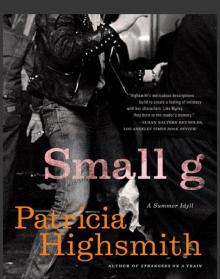 Small G: A Summer Idyll
Small G: A Summer Idyll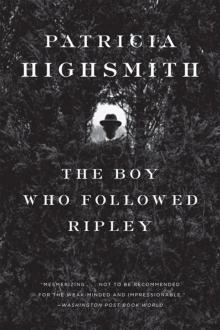 The Boy Who Followed Ripley
The Boy Who Followed Ripley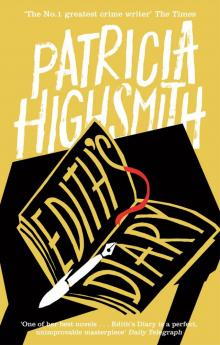 Edith's Diary
Edith's Diary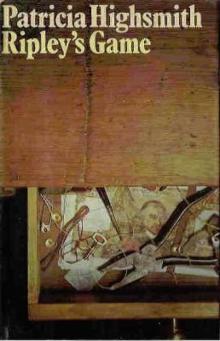 Ripley's Game
Ripley's Game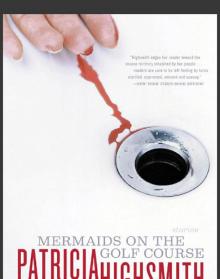 Mermaids on the Golf Course: Stories
Mermaids on the Golf Course: Stories Slowly, Slowly in the Wind
Slowly, Slowly in the Wind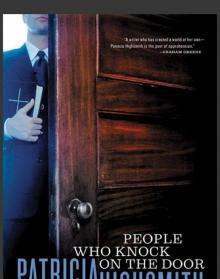 People Who Knock on the Door
People Who Knock on the Door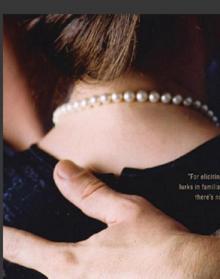 The Glass Cell
The Glass Cell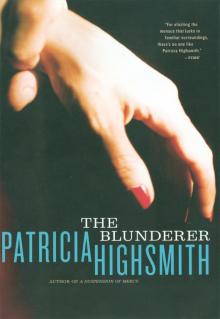 The Blunderer
The Blunderer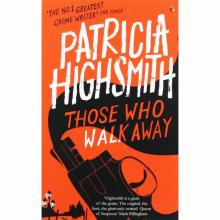 Those Who Walk Away
Those Who Walk Away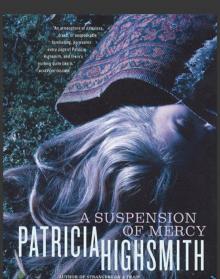 A Suspension of Mercy
A Suspension of Mercy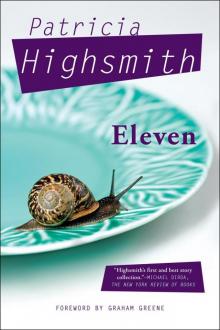 Eleven
Eleven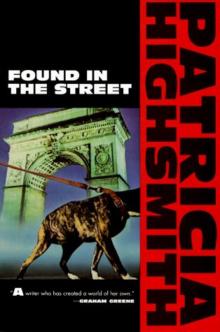 Found in the Street
Found in the Street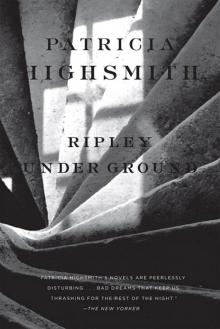 Ripley Under Ground
Ripley Under Ground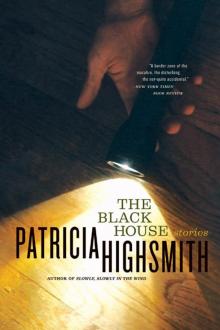 The Black House
The Black House The Cry of the Owl
The Cry of the Owl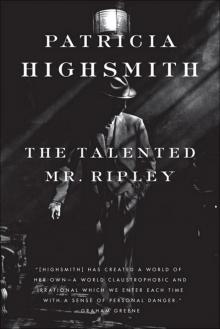 The Talented Mr. Ripley
The Talented Mr. Ripley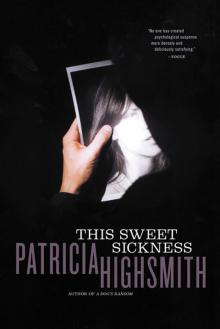 This Sweet Sickness
This Sweet Sickness The Two Faces of January
The Two Faces of January The Animal-Lover's Book of Beastly Murder
The Animal-Lover's Book of Beastly Murder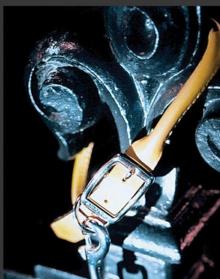 A Dog's Ransom
A Dog's Ransom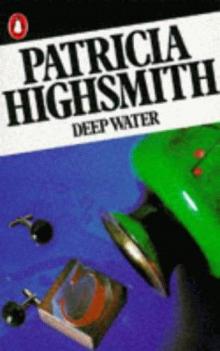 Deep Water
Deep Water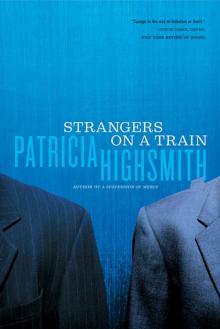 Strangers on a Train
Strangers on a Train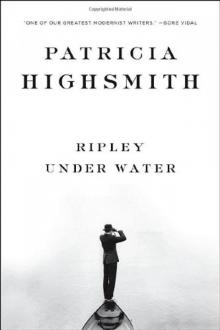 Ripley Under Water
Ripley Under Water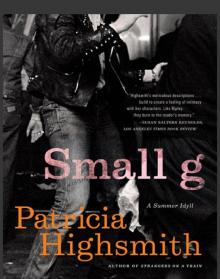 Small g
Small g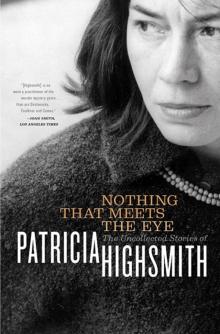 Nothing That Meets the Eye
Nothing That Meets the Eye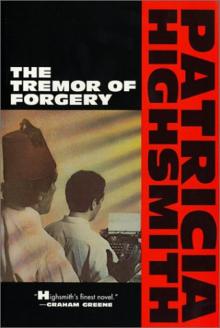 Patricia Highsmith - The Tremor of Forgery
Patricia Highsmith - The Tremor of Forgery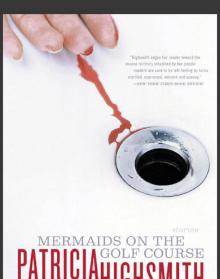 Mermaids on the Golf Course
Mermaids on the Golf Course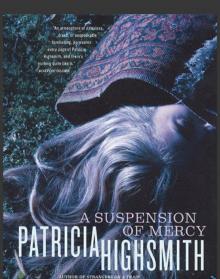 Suspension of Mercy
Suspension of Mercy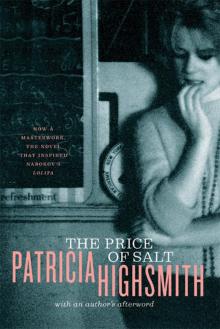 The Price of Salt, or Carol
The Price of Salt, or Carol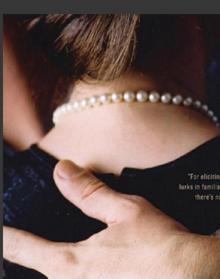 Glass Cell
Glass Cell